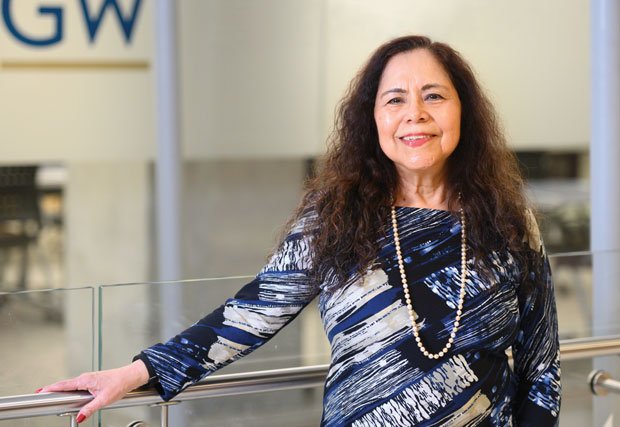In 2017, Antoinette Brosset tackled breast cancer with specialized care from her medical team at the George Washington University (GW) Hospital Cancer Center. When cancer "knocked on her door a second time" in 2018 with a colorectal cancer diagnosis, her GW team was there for her again, every step of the way, with support, compassion and an innovative treatment alternative. She calls her doctors the "dream team." Thanks to the minimally invasive surgery GW offers, her recovery from colorectal cancer was "a breeze" compared to what it could have been, she says. "I'm very blessed."
"My doctors at GW Cancer Center saved my life more than once."
Antoinette learned that she had colorectal cancer following a routine colonoscopy screening. Colorectal surgeon Bindu A. Umapathi, MD, explains that she had an early-stage cancer tumor located deep underneath the lining of her rectum. Unlike some rectal polyps, which can be removed during a colonoscopy, early-stage tumors can pose bleeding concerns and may be better treated with an advanced procedure called transanal minimally invasive surgery, or TAMIS, Dr. Umapathi says.
This procedure is offered at GW Hospital using the Medrobotics Flex® Robotic System, which can help surgeons access hard-to-reach anatomy. A compelling advantage is that surgery can be performed through the body's natural opening. "It's beneficial for the patient because it doesn't require abdominal incisions, there's usually no hospital stay, and patients recover faster and do well overall," Dr. Umapathi says. For Antoinette, the tumor was removed completely, and she required no additional surgery.
After her procedure, Antoinette recalls experiencing some bowel irregularity and bleeding, which can be expected in the first few days, but the pain was minimal and she appreciated the support of Dr. Umapathi and her team. Two weeks after surgery, she returned to her work as an attorney. Today she's back to her life with renewed energy and no colorectal issues.
Coping with two different cancer diagnoses has been challenging, but she found strength during both defining moments of her life at the GW Cancer Center. "I know I was going to have excellent care, and that was so reassuring," she says.
GW Hospital was the first hospital in the world to perform colorectal surgery with the Medrobotics Flex Robotic System – a robot system designed to navigate the body's twists and turns. This technology may be used to treat certain early-stage colorectal cancer tumors and polyps, as well as some head and neck conditions.
Individual results may vary. There are risks associated with any surgical procedure. Talk with your doctor about these risks to find out if robotic surgery is right for you.

